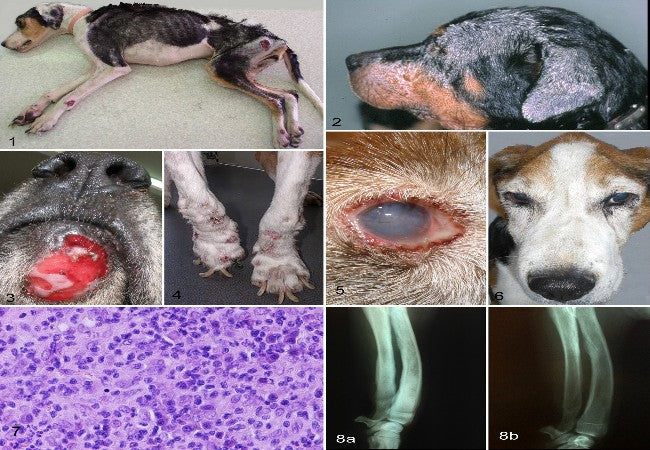Lymphomatoid Granulomatosis in Dogs: A 2025 Vet-Approved Guide to Symptoms, Diagnosis & Treatment🐶🧬

In this article
Lymphomatoid Granulomatosis in Dogs: A 2025 Vet-Approved Guide to Symptoms, Diagnosis & Treatment🐶🧬
By Dr. Duncan Houston BVSc
Lymphomatoid granulomatosis (LYG) is a rare and aggressive pulmonary disease in dogs, characterized by the infiltration of cancerous lymphoid cells into the lungs. This condition primarily affects the blood vessels within the lung tissue, leading to respiratory complications and potential spread to other organs. Early recognition and intervention are crucial for managing this disease effectively.
🧬 Understanding Lymphomatoid Granulomatosis
LYG involves the proliferation of malignant lymphoid cells, particularly around blood vessels in the lungs. This angiocentric growth can lead to vascular destruction and necrosis of lung tissue. While the exact cause remains unknown, certain factors may increase susceptibility:
- Breed and Size: Larger and purebred dogs appear more predisposed.
- Age: Typically affects middle-aged to older dogs, though cases in younger dogs have been reported.
- Immune System Factors: Underlying immunosuppression may contribute to disease development.
⚠️ Recognizing the Symptoms
LYG presents with respiratory and systemic signs that may progress over time:
- Persistent Cough: Often dry and non-productive.
- Difficulty Breathing: Labored or rapid respiration.
- Exercise Intolerance: Fatigue during physical activity.
- Weight Loss: Unexplained and progressive.
- Loss of Appetite: Decreased interest in food.
- Fever: Elevated body temperature in some cases.
These symptoms warrant prompt veterinary evaluation to determine the underlying cause.
🩺 Diagnostic Approaches
Accurate diagnosis of LYG involves a combination of clinical assessments and diagnostic tests:
- Physical Examination: Assessing respiratory sounds and overall health.
- Blood Tests: May reveal elevated white blood cell counts, including neutrophils, eosinophils, and basophils.
- Imaging: Chest X-rays or CT scans to identify lung abnormalities.
- Biopsy: Lung tissue sampling for histopathological confirmation.
Definitive diagnosis often relies on identifying characteristic angiocentric lymphoid infiltrates in lung tissue samples.
💊 Treatment Options
Management of LYG is challenging due to its aggressive nature. Treatment strategies may include:
- Chemotherapy: Utilizing protocols such as CHOP (cyclophosphamide, doxorubicin, vincristine, and prednisone) to target malignant cells.
- Corticosteroids: Prednisone may help reduce inflammation and tumor burden.
- Supportive Care: Oxygen therapy and nutritional support to alleviate symptoms.
It's important to note that treatment efficacy varies, and close monitoring for adverse effects is essential.
📈 Prognosis
The prognosis for dogs with LYG is generally guarded to poor, with median survival times reported around three months post-diagnosis. Factors influencing prognosis include:
- Extent of Disease: Localized versus widespread involvement.
- Response to Treatment: Some dogs may achieve temporary remission with aggressive therapy.
- Overall Health: Concurrent illnesses can impact treatment tolerance and outcomes.
Early detection and intervention may improve quality of life and extend survival in some cases.
🛡️ Preventive Measures
While specific prevention for LYG is not established, general health maintenance can aid in early detection:
- Regular Veterinary Check-ups: Routine exams to monitor for respiratory changes.
- Prompt Attention to Symptoms: Early evaluation of coughing or breathing difficulties.
- Healthy Lifestyle: Balanced diet and regular exercise to support immune function.
📱 Support and Resources
For additional support and information:
- Ask A Vet: Access professional veterinary advice through the Ask A Vet platform.
- Download the Ask A Vet App: For quick access to veterinary support, download the Ask A Vet app.
Early diagnosis and appropriate treatment can significantly improve your dog's quality of life.
🐾 For more expert advice and pet care tips, visit AskAVet.com.






